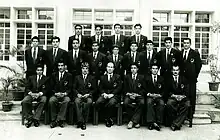Qayyum Changezi
Qayyum Changezi (born 1932) was a Pakistani footballer who played as a forward. Considered as one of the earliest legends in Pakistan football history,[1][2] he was known for his leadership, free kicks, and goal-scoring abilities.[3]
 Changezi in 1958 | |||
| Personal information | |||
|---|---|---|---|
| Full name | Qayyum Ali Changezi | ||
| Date of birth | 1932 | ||
| Place of birth | Quetta, British India | ||
| Date of death | Unknown | ||
| Place of death | Quetta, Pakistan | ||
| Position(s) | Forward | ||
| Senior career* | |||
| Years | Team | Apps | (Gls) |
| 1950 | Afghan Club Quetta | ||
| 1950s | Karachi Kickers | ||
| 1950s | Karachi Mohammedan | ||
| 1953–1959 | Balochistan | ||
| 1956 | Hazara Club | ||
| 1960s | Quetta | ||
| 1960s | Faisalabad | ||
| 1963–1965 | Railways | ||
| International career | |||
| 1955–1962 | Pakistan | ?? | (??) |
| 1963 | East Pakistan Sports Board XI | ||
| Managerial career | |||
| 1977 | Shaheen FC | ||
| *Club domestic league appearances and goals | |||
Early life
Belonging to the ethnic Hazara community, Changezi was born in Quetta in the Baluchistan Agency of British India in 1932.[4]
Club career
Nicknamed as "Papa", Changezi played as a left back in his early career until switching as a forward or winger.[4]
He developed an interest in football while attending high school, and made his debut in 1950 with Afghan Club Quetta.[4] In the 1950s, he toured in club tournaments in Iran and India with Karachi Kickers and Karachi Mohammedan, and in 1956 again with Karachi Kickers and Hazara Club.[4]
Changezi started playing in the National Championship league from 1953 and became member of the Balochistan team, who won the title in 1956 by defeating Pakistan Railways in Karachi on 11 November 1956, where he scored one goal in the final 2–1 victory, and declared Player of the year.[4][5]
Later on in 1959 under his captainship, Balochistan defeated East Pakistan in Hyderabad on 7 November 1959, achieving their second league title.[5] In the same tournament, he scored 6 goals in the 9–0 victory against Sindh Green.[4] When the football league structure in Pakistan transitioned from provincial to district based clubs, he subsequently represented Quetta, Railways and Faisalabad.[4] Under his captainship, Railways ended up in the second position in 15th and 16th National Championship in 1963 and 1965, after falling twice to Karachi, in the finals held in the cities of Karachi and Peshawar respectively.[4][5]
International career

Changezi made his international debut with the Pakistan national team during the 1955 Colombo Cup.[2] In his debut match, Changezi scored a hat-trick against Burma, becoming the second Pakistani player to do so after Masood Fakhri.[2][6]
In 1959, Pakistan first participated in the 1960 Asian Cup qualifiers hosted by India in Kerala. Under the captainship of Changezi, Pakistan faced Iran, India and Israel twice each in the qualifiers.[2] Although Israel managed to qualify by topping the group, Pakistan achieved a memorable victory over Iran by 4–1 and secure a draw against Israel, finishing in third place in the group, ahead of hosts India but behind Iran.[7]
Changezi also participated in various friendly tournaments, including the Merdeka Cup hosted in Malaysia after the country first participation in 1960.[8] Under his captaincy,[9] Pakistan recorded some famous victories including a 7–0 walloping of Thailand,[10] and a 3–1 win over then Asian powerhouses Japan.[10]
He was also present in the 1962 Merdeka Tournament, where Pakistan ended runner up after falling to Singapore by 1–2 in the final.[8]
During a 1963 global tour, Germany's Bundesliga club Fortuna Düsseldorf faced aircraft issues, leading to an unexpected stay in Pakistan.[9][3] The Pakistan Football Federation invited the club to play friendly matches against select XI teams from East and West Pakistan. Fortuna enthusiastically accepted, competing against teams like East Pakistan Sports Board XI in Dacca, which included the veteran Changezi, drawing crowds of thousands.[9][3]
Managerial career
In 1977, Qayyum was appointed as manager of the Shaheen FC club which toured in the Afghanistan Republic Day Cup in Kabul.[4][11]
Personal life
His younger cousin Younus Changezi also played for the Pakistan national team from the 1960s till early 1970s, and was later appointed as manager of the national team in the 1980s.[12]
Legacy
Highly still praised by the local Hazara community,[13] the Qayyum Papa Stadium in Mariabad in Quetta is named after him.[14][15][13]
Honours
Balochistan
- National Football League:[5] 1956, 1959
Pakistan Railways
- National Football League runner-up:[5] 1963, 1965
References
- Hyat, Kamila (2014-06-29). "The years of dreams | Special Report | thenews.com.pk". www.thenews.com.pk. Retrieved 2023-08-15.
- Ahsan, Ali (2010-12-23). "A history of football in Pakistan — Part I". DAWN.COM. Retrieved 2023-07-21.
- Editorial Staff (2011-05-20). "Lahore Free Kick contest named after Qayyum Ali Changezi". FootballPakistan.com (FPDC). Retrieved 2023-08-15.
- Editorial Staff (2013-03-07). "The great Qayyum Ali Changezi". FootballPakistan.com (FPDC) (in Urdu). Retrieved 2023-08-15.
- "Pakistan - List of Champions". www.rsssf.org. Retrieved 2023-08-15.
- "Asian Quadrangular Tournament (Colombo Cup) 1952-1955". www.rsssf.org. Retrieved 2023-07-21.
- "Asian Nations Cup 1960". www.rsssf.org. Retrieved 2023-08-17.
- "SPORTS WORLD: End to gloomy era of Pakistan football in sight". Brecorder. 2006-11-18. Retrieved 2023-08-15.
- Ahsan, Ali (2010-12-23). "A history of football in Pakistan — Part II". DAWN.COM. Retrieved 2023-08-15.
- "Merdeka Tournament 1960". www.rsssf.org. Retrieved 2023-07-18.
- "Afghanistan Republic Day Festival Cup (Kabul, Afghanistan)". www.rsssf.org. Retrieved 2023-08-15.
- Editorial Staff (2011-04-23). "[FPDC Exlusive] Pak football legend Yunus Changezi interview". FootballPakistan.com (FPDC). Retrieved 2023-08-15.
- "No ground for future football stars of Hazara community". Daily Pakistan Global. 2017-01-27. Retrieved 2023-08-15.
- Independent, The (2019-08-03). "Fear and persecution in Pakistan's Hazara community". Head Topics. Retrieved 2023-08-15.
- "'Under siege' - Fear and defiance mark life for Pakistan's minority Hazaras". inkl. 2019-07-04. Retrieved 2023-08-15.